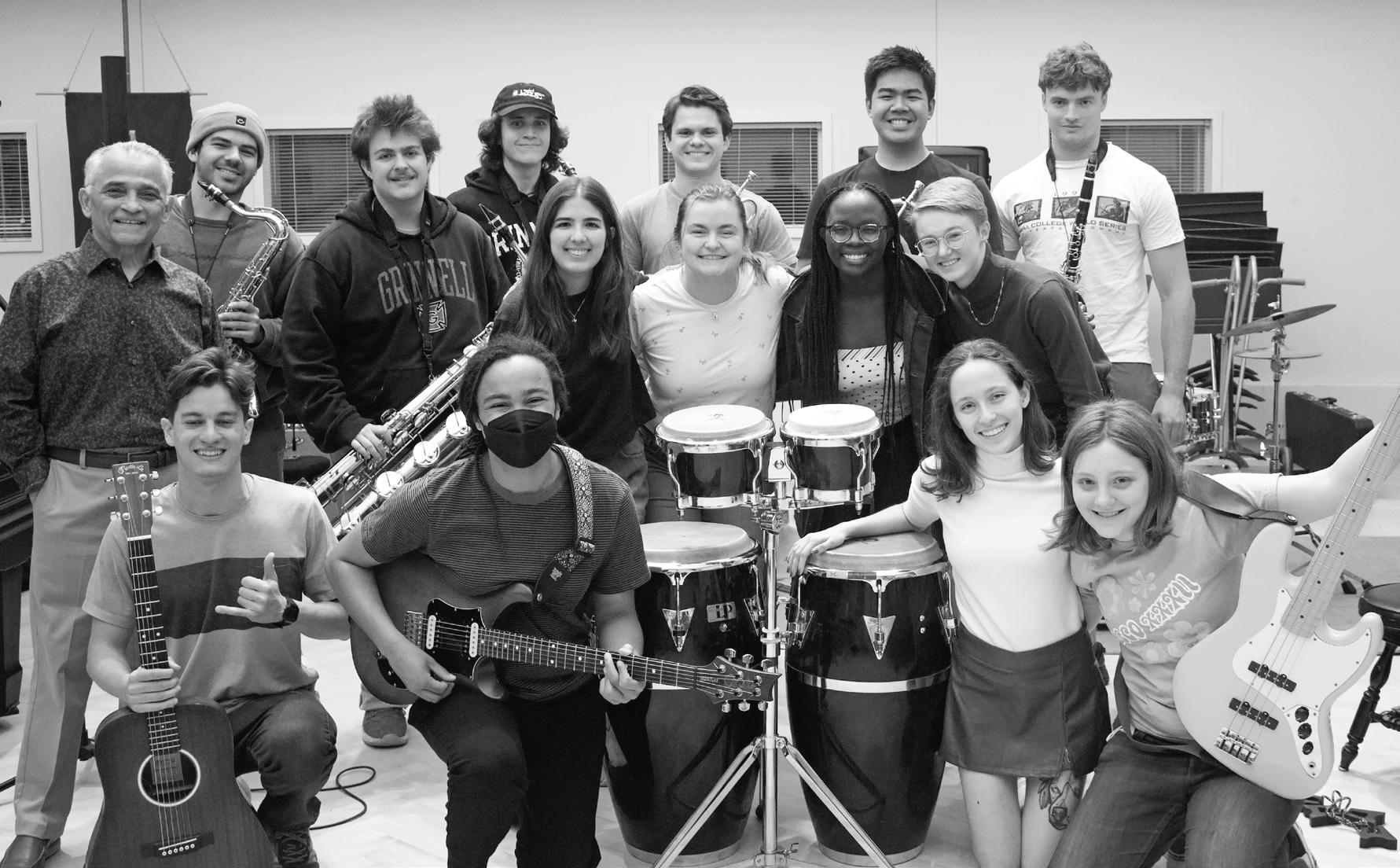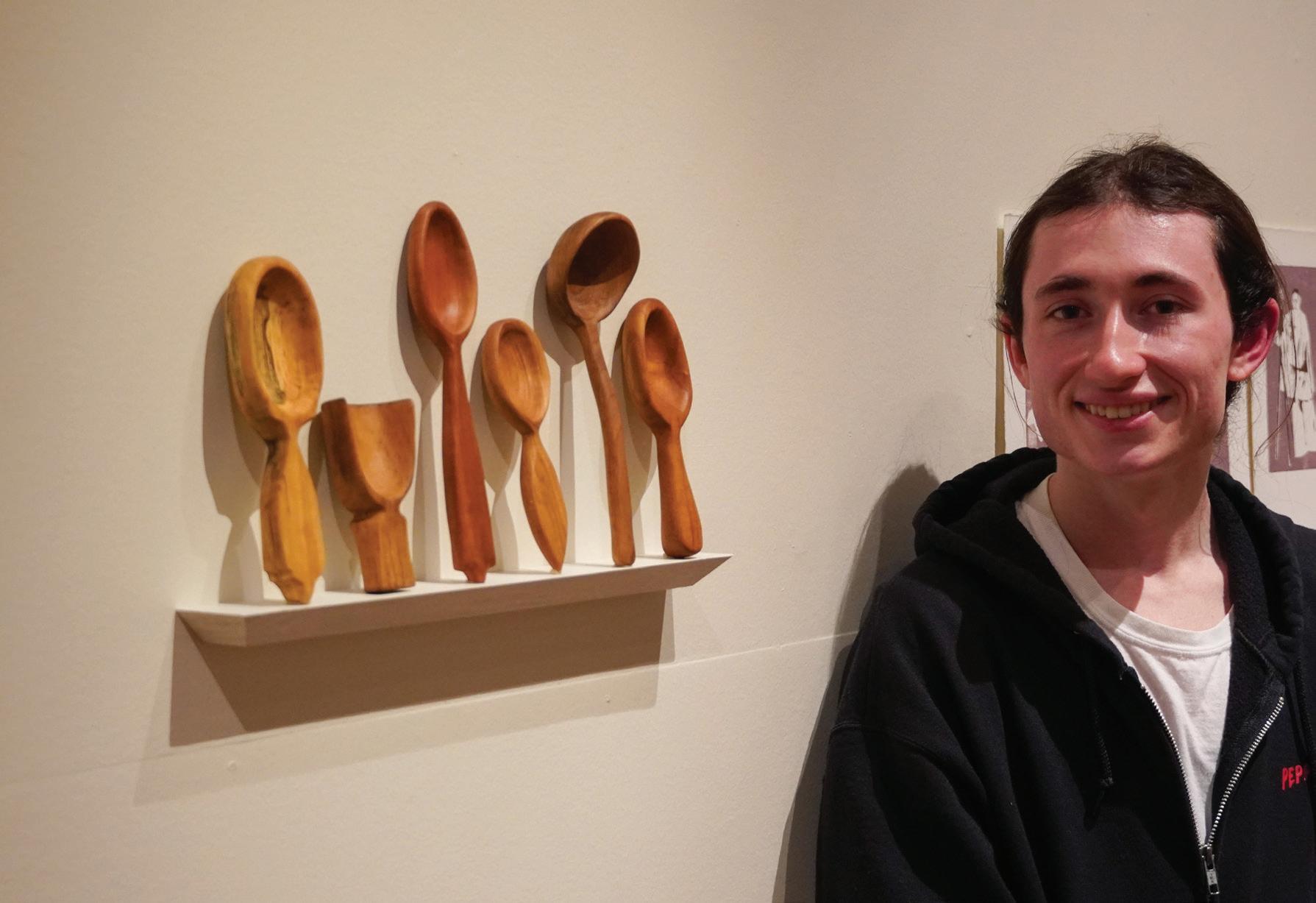
6 minute read
Funding changes endanger future student org events Andrea Tracy appointed to academic dean
By Molly Wilcoxson wilcoxso2@grinnell.edu
When looking at the Grinnell College student body, Andrea Tracy, associate professor of psychology, sees one predominant problem — stress. And now, as she prepares to assume the position of the associate dean of student academic life, she hopes to tackle the issue head-on.
Advertisement
Tracy will officially assume the associate dean position on July 1, replacing Cynthia Hansen, professor of anthropology, who stepped down from the position to take a sabbatical from the College during the fall 2023 semester. Following the opening of the position, Tracy submitted an application to Beronda Montgomery, vice president of academic affairs and dean of the College, to which she was then appointed.
using SGA-approved funds.
Removing the ability to acquire clothing and accessories would primarily impact international and cultural groups, Dawood and Doan said, because those groups comprise the majority of student organizations requesting clothing.

Dawood also said that ICCO was only approved to use a limited number of websites to purchase food, which she said might not include options for authentically made international cuisine.
In an email to the S&B, Adams wrote that, “SGA and Student Involvement are working together to streamline processes for clothing,” in response to a request for comment on if student organizations will be allowed to use SGA funds to purchase clothing next fall.
Additionally, Dawood said that because of delays in funding approval, some tablecloths and other utilities did not arrive on time, and ICCO cabinet members purchased about $60 of supplies out-of-pocket.
“We often have to buy things with our money,” Dawood said.
Prior to the fall, students in Student Educational Policy Committees and student organizations who purchased supplies for events or organizations using personal funds were allowed to request reimbursement from the College. However this year, SGA and Student Involvement stopped allowing reimbursement.
“If students are following the funding processes and procedures, they won’t need to spend out of pocket,” Adams said. “Students that could afford to go out and purchase things would go out and go around the actual budgeting process.”
Adams also alleged that allowing reimbursement unfairly disadvantaged students who were unable to afford to spend out-of-pocket, even if later reimbursed, compared to students willing to initially spend money out-of-pocket.
Sarah Toay `23, SGA treasurer, declined request for a verbal inter- view, citing a lack of time. In a later email to the S&B, Toay wrote that SGA worked with the accounting office and the division of student affairs to craft a new reimbursement process that met fair, legal and ethical standards, and that the process is continually changing in response to student feedback.
SGA treasurers, not Student Involvement, have typically been the primary advocates for changing to funding and budget requests, including this year, according to Adams. She added that the SGA treasurer reviews budget proposals, and Student Involvement only assists in the application if there is a potential for something harmful or high-risk, including in food safety, or to assist in tax-exemption procedures because the College is a 501(c)(3) non-profit.
We often have to buy things with our money.
Nameera Dawood `23
“I have an obligation within my position, professionally, to make sure that we are being compliant with state and federal laws, and assessing risk management and liability,” Adams said.
Adams said part of the rationale to create standardized funding guidelines was in response to archival records internal to SGA which revealed students receiving funds which were alleged to be using the funds improperly.
“There has been money spent not in ethical ways. In terms of a student requesting funds or a student gaining access to funds that didn’t benefit their student organization but benefited them personally,” she said, citing examples of SGA-approved funds being used for personal technology, steel bows and arrows and non-academic international travel unrelated to a student organization.
“We have a really high student activity fee at the College, so administrators, staff and the students in SGA are concerned that students are paying so high of an amount of the student activity fee,” Adams said, referring to the $492 student activity fee for the 2022-23 academic year. “So how do we make sure again that we’re being ethical in our spending, and how do we make sure that we’re supporting all students?”
Adams said she recognized the issues that can arise with allowing SGA-approved purchases only on two SGA credit cards. This spring, both SGA credit cards were used fraudulently, according to Adams, causing each card to be deactivated at different times in the semester. At one point, zero cards were available for use.
During the interim, DSA and staff members offered other cards for usage, including when purchasing items for the ICCO International Dinner.
Adams said one of the biggest problems that have complicated the ability of student organizations to apply for funding has been SGA and Student Involvement’s lack of a central website for students to find policies and procedures. Instead, Adams said heads of student organizations have relied on accessing funding policies by either finding the policy documents from the fall semester by searching their email inbox or by reaching out to SGA or Student Involvement. Though these policies were primarily provided to student organization leaders, any student may request SGA funding.
“The only way we have to communicate this is via email, and that’s not effective, and we know that it’s not effective,” Adams said. She also said she cannot provide a timeline for when SGA or Student Involvement will release a working website.
Adams said that if students are confused about how to receive funding for events or supplies, they should go directly to DSA or email [studentinvolvement] with 48 hours notice.
“I would really appreciate feedback,” she said. “Student Involvement wants that feedback. What’s working well? What do we need to improve on?” sure of her specific duties until she assumes the position, she is confident that she will be contributing to CAS, academic advising and faculty assessments. She said that her approach to the role is to attempt to find a balance between managing student and faculty burnout while also efficiently and successfully managing the institution’s required functions.
The role is one of three positions intended for current faculty. The associate dean of curriculum and academic programs has been Tim Arner, associate professor of English, for the past five years. The second dean position will also have a staff turnover this July — Caleb Elfenbein, associate professor of religious studies and history, will be replacing Jin Feng, professor of Chinese and Japanese.

“Prior to the pandemic, we were seeing a lot of increasing amounts of stress and mental health issues, and faculty feeling overworked in their positions,” Tracy said. “And that started before the pandemic, but it became much more evident [throughout].”
Tracy said that she chose to apply for this role because it aligned with her academic and personal interests, and she wants to see change in the way student academic life is managed.
“I have been feeling like I would want to move that work forward in a very different way,” she said.
The designated roles of the associate dean of student academic life position are not set in stone. Although each position has its own separate title, a choice made by Anne Harris during her time as the College’s interim president, their responsibilities often overlap or are dependent upon the interests of the deans themselves. The official duties assigned to the three dean positions from the 2021-22 academic year are available on SharePoint and accessible to all Grinnell College students.
During this year, the student academic life position presided over several things including, but not limited to, Mentored Advanced Projects (MAPs), the Science Learning Center, math and computer science labs, independent study curriculums, peer mentoring, department assessment and academic software requests. The dean also serves as the chair of the Committee on Academic Standing (CAS).
Tracy said that, while she is un-
She also said, “What I would like to see is changes to the way we do things that can mediate some of this, and focus on what we really want to get done in terms of development. But we know that there are also all of these things we have to do to keep the institution running.”
She said that finding the happy medium is not easy because important aspects of doing so involve making people feel like their work is important and asking people to contribute in ways that are respectful of their time.
“We feel less stressed and overworked if we feel like what we’re doing is valuable,” Tracy said.
Tracy also said that she wanted to ensure that regular assessment of policies occur so that people feel as though they are getting something out of their education. Furthermore, she said she wants to ensure that there is a strong intersection between technology and academics so things can be done effectively.
At the end of the day, according to Tracy, the goal is for both students and faculty to feel as though they are getting the most out of their Grinnell College education.
“We want to make sure that people are moving forward through their trajectory at Grinnell in the most effective way for them,” Tracy said.










